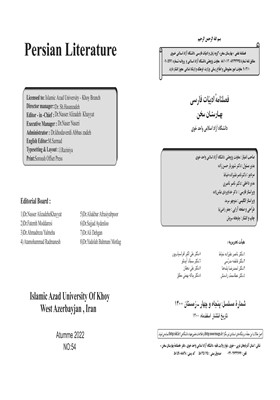The Concept of joyance and its Synonyms from the View Point of Khayyam , Khagani and Salman Sawaji
Subject Areas : Abstract ArticlesMas'ud Partovi Nejad Foomani 1 , Mohammad Reza Shad Manamen 2 * , Alireza Nikooee 3
1 - PhD Student, Department of Persian language and literature, Khalkhal branch, Islamic Azad University, Khalkhal, Iran.
2 - Assistant professor Department of Persian language and literature, Khalkhal branch, Islamic Azad University, Khalkhal , Iran.
3 - Associate professor Department of Persian language and literature, Gilan University, college of Humanities, Gilan, Iran.
Keywords: Khayyam, poem, Introduction, Keywords: joyance, Khgani, Salman Sawaji,
Abstract :
Abstract Joyance, the internal tranquility, which causes the human mentality to understand and have pleasure, is manifested by cheerfulness and smiling expression in man. Nowadays, numerous criteria are introduced to create joy and relative decrease of sadness which some of them have little or short term impact on hilarity of man. Literature and poems of poets have had increasing effect on people's minds and souls in different settings. One of the most significant matters from the view point of poets is joyance and its derivatives; therefore, in this essay, we have tried to investigate the matter of happiness from the three poets' perspectives, and it was revealed that Khayyam, besides his philosophical and mathematical insights , considers the world ephemeral and invites people to joy and happiness and to take advantage from the short life. Khagani, in addition to his knowledge in other sciences, calls his readers to have pleasure in life and by alluding to festivals, ceremonies, and kings' feasts and description of nature encourages the common people to have high spirit. Salman Sawaji considers love mostly spiritual and emphasizes on internal joy.
فهرست منابع و مآخذ
1- قرآن کریم.
2- نهجالبلاغه.
3- آردگایل، مایکل، (1383)، روان شناسی شادی، ترجمه: م. گوهری، ح. نشاط دوست، ح. بهرامی، اصفهان: جهاد دانشگاهی.
4- ابن فارس، احمد بن زکریّا، (1399 ق)، معجم المقاییس اللغة، ترجمة عبدالسّلام محمّد هارون، قم: دارالفکر الطبعه.
5- پورنامداریان، تقی، (1382)، در سایۀ آفتاب، تهران: سخن.
6- خاقانی شروانی، افضلالدّین، (1368)، دیوان خاقانی، به تصحیح ضیاءالدّین سجّادی، تهران: سخن.
7- خیّام نیشابوری، عمر، (1367)، کلیّات آثار پارسی حکیم عمر خیّام، به اهتمام محمّد عباسی، تهران: هیرمند.
8- دهخدا، علیاکبر، (1373)، لغت نامه، تهران: دانشگاه تهران.
9- رستگار فسایی، منصور، (1381)، فردوسی و هویّت شناسی ایرانی، تهران: طرح نو.
10- ساوجی، سلمان، (1371)، دیوان سلمان ساوجی، با مقدّمه و تصحیح ابوالقاسم حالت، تهران: ماه.
11- صفا، ذبیح الله، (1366)، تاریخ ادبیّات در ایران، تهران: فردوس.
12- طریقهدار، ابوالفضل، (1379)، شرع و شادی و دیدگاههای فقهی، قم: مؤسّسة فرهنگی حضور.
13- کریستن سن، آرتور امانوئل، (1378)، ایران در زمان ساسانیان، ترجمة غلامرضا رشید یاسمی، تهران: صدای معاصر.
14- لطف آبادی، حسین، (1380)، «روانشناسی رشد اخلاقی، ارزشی و دینی در نوجوانی و جوانی» مجلة روان شناسی اسلانی، دورة 7، تابستان، شماره 29، صص: 62-97.
13- معین، محمّد، (1381)، فرهنگ نامه، تهران: زرّین.
_||_
